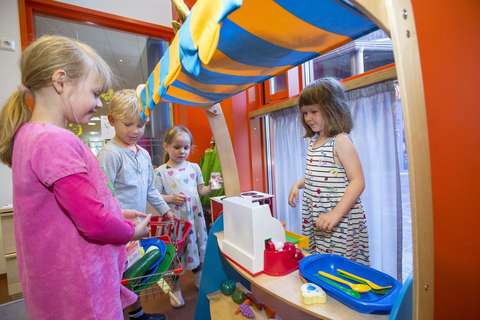Play is an inexhaustible source of joy and learning

Play has an important pedagogical significance, which is why early childhood education pays special attention on play.
All children know how to play! At least, many adults may think so, and it is true in a way. Play is every child’s natural way of expressing themselves. However, adult support and participation in play can add value for the child’s development. That is why play is at the heart of pedagogy in early childhood education.
In Espoo’s early childhood education, play and play skills are considered so important that the city’s day-care centres put a special emphasis on play.
Jaana Särmälä and Suvi Leppälä, Early Education and Care Specialists in Espoo Early Childhood Education, say that play is a natural way for children to learn and develop, so play has great pedagogical significance in early childhood education.
“Play is very important for children’s well-being and development. Playing allows children to practise friendship skills, forming social relationships, self-expression, creativity, motor skills, attention span and reciprocity. Developmental play includes a lot of positives,” say Särmälä and Leppälä.
“Play also teaches the vocabulary and concepts of language. The passion for learning is often sparked when the child is playing,” says Suvi Leppälä. “Play is also a way for children to process things they have experienced and to structure the world,” she says.
Because play is so important, early childhood educators talk about play development.
It may sound funny, but it is actually about developing a wide range of knowledge and skills learned through play by observing, supporting and subtly guiding the children if needed. In Espoo, self-assessment criteria aimed at early childhood education units have also been utilised to support play development.
How might a teddy bear feel when its paw is being treated?
In early childhood education, professionals support play because it has many benefits for children and their development.
According to Särmälä and Leppälä, play skills are important. Good play skills are practiced by playing in a variety of ways. In play, children learn emotional skills, how to put themselves in the position of another and how to deal with things they have experienced.
“Play is about practising assuming different roles. By playing, children learn that the world looks different from different perspectives and roles. When they pretend to tend to a teddy bear’s paw or a friend’s finger, for example, it also hones their empathy skills and understanding of another person’s experience,” Särmälä says of the importance of roleplay.
“In early childhood education, we observe how play is going and developing. If support is needed, an adult can help by guiding the play in a better direction. It is also important for adults to be able to join the play, if needed, and then perhaps fade into the background once the plot and interaction are running under their own cheerful steam,” says Suvi Leppälä.
An adult should intervene if the play gets stuck on something, there is conflict between the players or the play only lasts a short time. Intervention is also needed if one player has such a dominant role that they determine the direction of play every time, or if the same child always ends up playing, for example, the dog when playing house.
In early childhood education in Espoo, every child is supported with participating in play and encouraged to act in such a way as to ensure that everyone has equal opportunities to participate.
“Conflicts cannot always be avoided in play or in life, but they provide an opportunity to learn constructive dispute resolution and settling issues disagreements,” says Jaana Särmälä.
Enriching and enjoying play
Part of play development is also that early childhood education professionals help children enrich and diversify the world of play.
What does enrichment mean in practice?
It may mean, for example, that when children spontaneously put up a pizza place, for example, new elements are introduced into the play with the support of an adult.
Children can practise using play money to pay for food and correctly make change. This also lets children practise mathematical skills. On the side, children can be introduced to, say, the Italian language, culture or geography naturally through play. With the support of an adult, children can try to guess what kind of pizza is frutti di mare or bolognese and where Italy is on the map.
When playing with toy cars, on the other hand, an adult can add some elements of learning traffic rules. At the same time, children can make music or learn traffic-themed songs, for example. In fact, early childhood education professionals are masters at exploiting opportunities for learning through play.
However, even in early childhood education, not all play needs to be harnessed as a learning tool or pedagogical method.
“Although the benefits of play are obvious, play also always has an intrinsic value for the child. It is important to remember the joy and delight that comes from play. Above all, playing is a joyful thing,” says Suvi Leppälä.